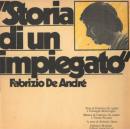Cayenne
Anonymous
Cayenne
Chanson française – Cayenne – anonyme – vers 1900.
Interprétation : Parabellum
Cette chanson anarchiste des environs de 1900 souvent chantée au bagne de Cayenne, souvent attribuée à Bruant. Elle fut reprise avec succès par le groupe de rock Parabellum en 1986, mais le dernier couplet a volontairement été omis par le parolier de l'époque. Puis par Les Amis d'ta femme, en 2000. Ces derniers donneront une alternative au refrain à la fin de la chanson. Opium du peuple a fait une reprise de la version de Parabellum en 2014 ; version intégrée sur l'album La revanche des clones en 2015.
Elle est parfois également interprétée par Sanseverino lors de ses concerts, de même pour le groupe "Le grôs tour".
Le dialogue maïeutique avec l'âne
Voici encore, Lucien l'âne mon ami, une chanson à propos de Cayenne, ce terrible bagne que la France entretînt en Guyane jusqu'en 1946 ; du moins,... (Continues)
Chanson française – Cayenne – anonyme – vers 1900.
Interprétation : Parabellum
Cette chanson anarchiste des environs de 1900 souvent chantée au bagne de Cayenne, souvent attribuée à Bruant. Elle fut reprise avec succès par le groupe de rock Parabellum en 1986, mais le dernier couplet a volontairement été omis par le parolier de l'époque. Puis par Les Amis d'ta femme, en 2000. Ces derniers donneront une alternative au refrain à la fin de la chanson. Opium du peuple a fait une reprise de la version de Parabellum en 2014 ; version intégrée sur l'album La revanche des clones en 2015.
Elle est parfois également interprétée par Sanseverino lors de ses concerts, de même pour le groupe "Le grôs tour".
Le dialogue maïeutique avec l'âne
Voici encore, Lucien l'âne mon ami, une chanson à propos de Cayenne, ce terrible bagne que la France entretînt en Guyane jusqu'en 1946 ; du moins,... (Continues)
Je me souviens encore de ma première femme ;
(Continues)
(Continues)
Contributed by Marco Valdo M.I. 2016/2/19 - 22:37
Il giorno prima

(1984)
Album: "Aloha"
Album: "Aloha"
Può accadere senza che la sveglia suoni, a metà di un sogno o un tiro di pallone
(Continues)
(Continues)
Contributed by Lucia Pergher 2016/2/19 - 20:28
Song Itineraries:
No Nukes
Dall'altra parte

Album: "Il colore dei pensieri" (1987)
La descrizione malinconica di come si vive nei paesi del Patto di Varsavia porta l'ascoltatore a commuoversi e a riflettere sulle note di Dall'altra parte, brano conclusivo dell'album, che si apre con una introduzione al pianoforte molto malinconica, che lo stesso Facchinetti ammette di aver mutuato da una composizione sentita quasi un decennio prima durante un soggiorno in Romania in occasione della loro tournée nei paesi dell'Est Europa.
La descrizione malinconica di come si vive nei paesi del Patto di Varsavia porta l'ascoltatore a commuoversi e a riflettere sulle note di Dall'altra parte, brano conclusivo dell'album, che si apre con una introduzione al pianoforte molto malinconica, che lo stesso Facchinetti ammette di aver mutuato da una composizione sentita quasi un decennio prima durante un soggiorno in Romania in occasione della loro tournée nei paesi dell'Est Europa.
Dall'altra parte fanno estate i girasoli
(Continues)
(Continues)
Contributed by Lucia Pergher 2016/2/19 - 20:25
’Â çímma

Dennis Criteser [2014]
In "A çimma," a cook explains how a classic Geno(v)ese dish is made. A piece of meat usually taken from the stomach or breast of the young calf is folded and sewn on three sides to make a pocket that is then filled with many ingredients: innards, peas, eggs, cheese, spices, etc. The final side is sewn shut and the meat is boiled carefully in a broth for several hours, punctured with a needle from time to time to prevent the rupturing of the pocket as the ingredients expand. Traditionally, one must take care to prevent trouble from witches and devils who might be attracted by the intoxicating smells. And once done, the tradition is for the servants to remove the glorious cima, leaving the cook out of the picture with only the steam from the now empty pot. Also traditionally, a bachelor makes the first cut. The cook, with a touch of bitterness, tells everyone to eat because you never know who will be out to eat you. - Dennis Criteser
BOILED STUFFED VEAL
(Continues)
(Continues)
Contributed by Riccardo Venturi 2016/2/19 - 08:32
La ballata dell'eroe

Dal blog Fabrizio De André in English
"La ballata dell'eroe" was the B-side of the 45 released by Karim in 1961 that De Andrè considers his first published work (the A-side was "La ballata del Michè"). With the Cold War raging between the US and the USSR, and in the context of the unfolding Berlin Crisis, this song was a simple yet powerful anti-war ballad. The song was re-recorded by Luigi Tenco in 1962 and appeared in the movie "La Cuccagna." The song was republished in 1964 as the B-side to "La guerra di Piero" and also reinterpreted and included on Volume III. Though not officially credited, according to the sheet music of the song the music was written by Elvio Monti, who worked for Karim as arranger and orchestra conductor and who collaborated on many of De Andrè's songs released by that label. - Dennis Criteser
BALLAD OF THE HERO
(Continues)
(Continues)
Contributed by Riccardo Venturi 2016/2/19 - 06:44
Canzoniere del Lazio: Bevi, bevi compagno (Se nasce l'anarchia)

BOIS BOIS CAMARADE (L'ANARCHIE NAÎT)
(Continues)
(Continues)
Contributed by Keskonsmär Parici 2016/2/18 - 22:07
Les Bambous
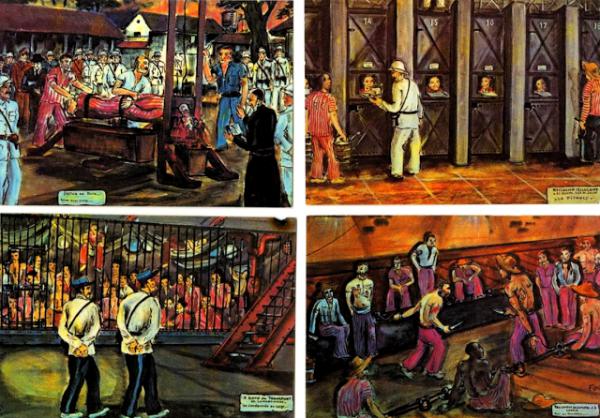
Les Bambous
Chanson française – Les Bambous – Maurice Dulac – 1970
Texte : Boris Bergman (interprétation 1974 – Album : Le Tzigane et la fourmi)
Musique : Maurice Dulac
Lucien l’âne mon ami, toi qui es foncièrement herbivore, tu auras certainement souvenance de la chanson de Karel Kryl que j’avais mise en langue française l’autre jour et qui s’intitule HERBE [(Tráva).
Bien évidemment que je m’en souviens. C’était il y a deux ou trois jours. Je ne suis quand même pas gâteux malgré mon âge millénaire. Mais comme tu le sais, vivre en écriture, ça conserve. Dans cette chanson, il était question de la guerre du Vietnam et de bambous.
Précisément. Et à propos de bambous encore, au moment où je transcrivais cette version française d’une chanson tchèque, s’est mis à me trottiner dans la tête un air entendu autrefois. C’était la ritournelle d’une chanson où il était question de bambous et... (Continues)
Chanson française – Les Bambous – Maurice Dulac – 1970
Texte : Boris Bergman (interprétation 1974 – Album : Le Tzigane et la fourmi)
Musique : Maurice Dulac
Lucien l’âne mon ami, toi qui es foncièrement herbivore, tu auras certainement souvenance de la chanson de Karel Kryl que j’avais mise en langue française l’autre jour et qui s’intitule HERBE [(Tráva).
Bien évidemment que je m’en souviens. C’était il y a deux ou trois jours. Je ne suis quand même pas gâteux malgré mon âge millénaire. Mais comme tu le sais, vivre en écriture, ça conserve. Dans cette chanson, il était question de la guerre du Vietnam et de bambous.
Précisément. Et à propos de bambous encore, au moment où je transcrivais cette version française d’une chanson tchèque, s’est mis à me trottiner dans la tête un air entendu autrefois. C’était la ritournelle d’une chanson où il était question de bambous et... (Continues)
Tu dors sous les bambous, les bambous, les bambous,
(Continues)
(Continues)
Contributed by Marco Valdo M.I. 2016/2/18 - 21:46
Song Itineraries:
From World Jails
The Ghost Of Tom Joad

Il dialogo tra Tom e la madre citato nel finale della canzone:
Ma said, “How’m I gonna know ’bout you? They might kill ya an’ I wouldn’ know. They might hurt ya. How’m I gonna know?”
Tom laughed uneasily, “Well, maybe like Casy says, a fella ain’t got a soul of his own, but on’y a piece of a big one — an’ then —”
“Then what, Tom?”
“Then it don’ matter. Then I’ll be all aroun’ in the dark. I’ll be ever’where — wherever you look. Wherever they’s a fight so hungry people can eat, I’ll be there. Wherever they’s a cop beatin’ up a guy, I’ll be there. If Casy knowed, why, I’ll be in the way guys yell when they’re mad an’ — I’ll be in the way kids laugh when they’re hungry an’ they know supper’s ready. An’ when our folks eat the stuff they raise an’ live in the houses they build — why, I’ll be there. See? God, I’m talkin’ like Casy. Comes of thinkin’ about him so much. Seems like I can see... (Continues)
Ma said, “How’m I gonna know ’bout you? They might kill ya an’ I wouldn’ know. They might hurt ya. How’m I gonna know?”
Tom laughed uneasily, “Well, maybe like Casy says, a fella ain’t got a soul of his own, but on’y a piece of a big one — an’ then —”
“Then what, Tom?”
“Then it don’ matter. Then I’ll be all aroun’ in the dark. I’ll be ever’where — wherever you look. Wherever they’s a fight so hungry people can eat, I’ll be there. Wherever they’s a cop beatin’ up a guy, I’ll be there. If Casy knowed, why, I’ll be in the way guys yell when they’re mad an’ — I’ll be in the way kids laugh when they’re hungry an’ they know supper’s ready. An’ when our folks eat the stuff they raise an’ live in the houses they build — why, I’ll be there. See? God, I’m talkin’ like Casy. Comes of thinkin’ about him so much. Seems like I can see... (Continues)
2016/2/18 - 19:57
The Unknown Soldier
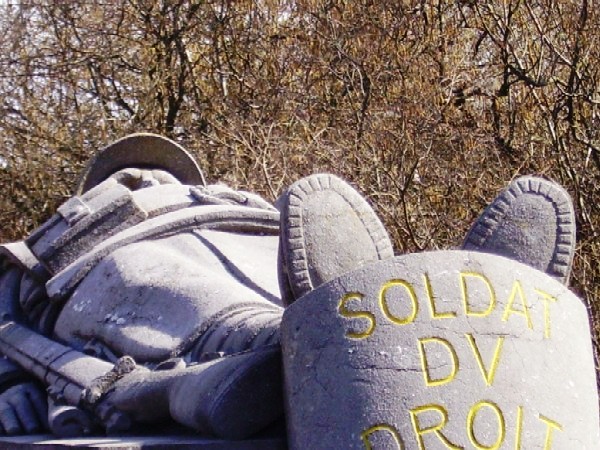
[1980]
Parole e musica di Roy Harper
La traccia che dà il titolo (e la copertina) all’album
Una canzone nata dopo una visita a Verdun…
Negli ultimi versi, un’attualizzazione: il soldato morto sui campi della Grande Guerra veglia sul sonno e sui sogni degli innocenti, dei bambini, e insieme a loro andrà a fare a pezzi il bastardo che tiene il dito sul pulsante che può scatenare la guerra finale, quella nucleare…
[…] Perhaps the most remarkable moment in the history of the making of this record was the trip I made with Adrian Boot, later to photograph Bob Marley so completely, to the battlefield at Verdun in France to take the pictures for the sleeve. Pete (Jenner) had just read a book called- 'The Price Of Glory' Verdun 1916, by Alistair Horne, and he suggested Verdun as an idea. I seized on the idea immediately and Adrian and I were soon disembarking at Boulogne in an undrivable hired... (Continues)
Parole e musica di Roy Harper
La traccia che dà il titolo (e la copertina) all’album
Una canzone nata dopo una visita a Verdun…
Negli ultimi versi, un’attualizzazione: il soldato morto sui campi della Grande Guerra veglia sul sonno e sui sogni degli innocenti, dei bambini, e insieme a loro andrà a fare a pezzi il bastardo che tiene il dito sul pulsante che può scatenare la guerra finale, quella nucleare…
[…] Perhaps the most remarkable moment in the history of the making of this record was the trip I made with Adrian Boot, later to photograph Bob Marley so completely, to the battlefield at Verdun in France to take the pictures for the sleeve. Pete (Jenner) had just read a book called- 'The Price Of Glory' Verdun 1916, by Alistair Horne, and he suggested Verdun as an idea. I seized on the idea immediately and Adrian and I were soon disembarking at Boulogne in an undrivable hired... (Continues)
I am an old soldier
(Continues)
(Continues)
Contributed by Bernart Bartleby 2016/2/18 - 15:45
Song Itineraries:
Child Abuse, World War I (1914-1918)
Linea gotica
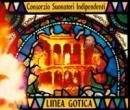
In Ferretti il filo conduttore non è mai stata l'ideologia politica, bensì la religiosità, il misticismo. Di volta in volta Ferretti ha ammantato questo aspetto con dottrine politiche diverse, come un quadro a cui, ogni tanto, viene cambiata la cornice, ma il dipinto resta sempre quello. E quindi noi abbiamo il Ferretti fino ai 20 anni, montanaro, cattolico e tradizionalista, il Ferretti anni 70/80, punk,squatter, proletario, cattolico e comunista e il Ferretti attuale, "tornato a casa" , nuovamente montanaro, cattolico e tradizionalista. Che poi questo l'abbia portato a cambiare idea su alcuni aspetti( da pro-Palestina a pro-Israele, da antiimperialista a sostenitore della guerra al terrorismo,da favorevole a aborto e divorzio a contrario ecc.) è si vero. Ma il filo conduttore, la religiosità, c'è sempre stato. Come ha detto giustamente Giorgio Canali "io queste cose le so da sempre, siete voi che vi fate distrarre dal buco nero dei suoi occhi".
Rothan 2016/2/18 - 13:42
Khorakhané (A forza di essere vento)

Dal blog Fabrizio De André in English
"Khorakhanè" is a song about the Romani people, who originated from India in the 14th century. Khorakhanè means lover of the Koran, and the Romanis of this song are a Serbian/Montenegran Islamic tribe. Due to the nomadic ways of Romani tribes, they are sometimes called "people of the wind." The first verse is the image of the conflict that Romanis feel about settling down to a perhaps easier life versus their impulse to keep moving. The second verse refers to several Romani practices: giving their children the names of people currently in power so as to win them over and gain the ability of passage across borders; hiding their jewels in loaves of bread to avoid having them discovered and taken; and marrying within the tribe to maintain social purity. The third verse presents an image of Romanis who have settled down (as is the case for the great majority... (Continues)
"Khorakhanè" is a song about the Romani people, who originated from India in the 14th century. Khorakhanè means lover of the Koran, and the Romanis of this song are a Serbian/Montenegran Islamic tribe. Due to the nomadic ways of Romani tribes, they are sometimes called "people of the wind." The first verse is the image of the conflict that Romanis feel about settling down to a perhaps easier life versus their impulse to keep moving. The second verse refers to several Romani practices: giving their children the names of people currently in power so as to win them over and gain the ability of passage across borders; hiding their jewels in loaves of bread to avoid having them discovered and taken; and marrying within the tribe to maintain social purity. The third verse presents an image of Romanis who have settled down (as is the case for the great majority... (Continues)
KHORAKHANÉ (BY WAY OF BEING WIND)
(Continues)
(Continues)
Contributed by Riccardo Venturi 2016/2/18 - 08:48
Le roi a fait battre tambour, ou La marquise empoisonnée
Anonymous

Il re fa rullare i tamburi - La versione inglese di Dennis Criteser
Dal blog Fabrizio De André in English
Dal blog Fabrizio De André in English
THE KING MAKES THE DRUMS ROLL
(Continues)
(Continues)
Contributed by Riccardo Venturi 2016/2/18 - 08:41
Le cul entre deux chaises
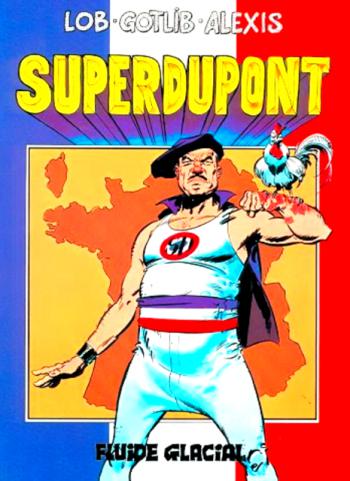
Le cul entre deux chaises
Chanson française – Le cul entre deux chaises – Maurice Dulac – 1975
Texte : Jacqueline Sorano – Maurice Dulac
Il y a des chansons et en corollaire, des chanteurs et même, des chanteuses de ces chansons qu’on découvre bien longtemps après le moment de leur floraison et même qu’ils aient fini de la chanter. Mais, te souviens-tu précisément, de ceci :
« Longtemps, longtemps après que les poètes ont disparu,
Leurs chansons courent encore dans les rues. », que disait, chantonnait Trenet. C’est le cas de cette chanson de Jacqueline Sorano, interprétée par Maurice Dulac en 1975. Elle s’intitule « Le cul entre deux chaises », mais, à voir ton œil égrillard, je te précise tout de suite ce n’est pas le cul de la patronne.
Là Marco Valdo M.I. mon ami, je t’arrête. C’est dommage, car comme tu le devines, j’aime beaucoup le cul de la patronne, c’est toujours pour moi,... (Continues)
Chanson française – Le cul entre deux chaises – Maurice Dulac – 1975
Texte : Jacqueline Sorano – Maurice Dulac
Il y a des chansons et en corollaire, des chanteurs et même, des chanteuses de ces chansons qu’on découvre bien longtemps après le moment de leur floraison et même qu’ils aient fini de la chanter. Mais, te souviens-tu précisément, de ceci :
« Longtemps, longtemps après que les poètes ont disparu,
Leurs chansons courent encore dans les rues. », que disait, chantonnait Trenet. C’est le cas de cette chanson de Jacqueline Sorano, interprétée par Maurice Dulac en 1975. Elle s’intitule « Le cul entre deux chaises », mais, à voir ton œil égrillard, je te précise tout de suite ce n’est pas le cul de la patronne.
Là Marco Valdo M.I. mon ami, je t’arrête. C’est dommage, car comme tu le devines, j’aime beaucoup le cul de la patronne, c’est toujours pour moi,... (Continues)
Je suis né sous le signe de la balance,
(Continues)
(Continues)
Contributed by Marco Valdo M.I. 2016/2/17 - 23:26
A Good Man Is Hard to Find (Pittsburgh)
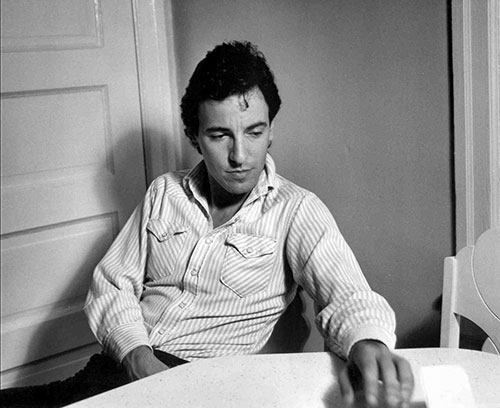
(1982)
Registrata durante le sessioni di Born in the U.S.A. e pubblicata in seguito in Tracks (1998)
Bruce Springsteen told Mark Hagen in an interview published in Mojo Magazine in January 1999: "The late '70s and early '80s was the first time when literature and films began to be made about Vietnam. There was a subtext on a few earlier things, there was a movie called 'Who'll Stop The Rain' with Nick Nolte, but all of a sudden it began to become very directly addressed. It began with a strange experience when I was driving across the country and I stopped in Arizona at a chug store and I bought a book called 'Born On The Fourth Of July'. I drove on to Los Angeles, and was at this little motel sitting at the pool and a fella came up, started talking and introduced himself: Ron Kovic. I thought, I must have met this fella, his name sounds real familiar, and he said, 'I wrote a book called... (Continues)
Registrata durante le sessioni di Born in the U.S.A. e pubblicata in seguito in Tracks (1998)
Bruce Springsteen told Mark Hagen in an interview published in Mojo Magazine in January 1999: "The late '70s and early '80s was the first time when literature and films began to be made about Vietnam. There was a subtext on a few earlier things, there was a movie called 'Who'll Stop The Rain' with Nick Nolte, but all of a sudden it began to become very directly addressed. It began with a strange experience when I was driving across the country and I stopped in Arizona at a chug store and I bought a book called 'Born On The Fourth Of July'. I drove on to Los Angeles, and was at this little motel sitting at the pool and a fella came up, started talking and introduced himself: Ron Kovic. I thought, I must have met this fella, his name sounds real familiar, and he said, 'I wrote a book called... (Continues)
It's cloudy out in Pittsburgh, it's raining in Saigon
(Continues)
(Continues)
2016/2/17 - 22:24
Song Itineraries:
War in Viet Nam as seen from the U.S.
Unità di Produzione

Io credo che tra il Ferretti attuale e quello degli anni'80 ci siano moltissimi punti di discontinuità ( da filopalestinese a filoisraeliano, da antiamericano a sostenitore delle guerre di Bush al terrorismo, da cattolico libertario favorevole ad aborto e divorzio a cattolico tradizionalista che considera gli stessi crimini ecc.)..Ma ci sono anche punti di contatto, come il concetto di Patria, di un mondo con dei confini( GLF non è mai stato un comunista internazionalista), di identità.
E poi forse molti non sanno che GLF fino a vent'anni aveva le stesse idee di ora, si "convertì" al Comunismo dopo il trasferimento a Bologna e l'approdo a Lotta Continua. In Varie interviste ha parlato di un "ritorno a casa", come dire che le sue idee reali sono queste e quella comunista è stata solo una parentesi della sua vita che pure non rinnega. Ciauz :)
E poi forse molti non sanno che GLF fino a vent'anni aveva le stesse idee di ora, si "convertì" al Comunismo dopo il trasferimento a Bologna e l'approdo a Lotta Continua. In Varie interviste ha parlato di un "ritorno a casa", come dire che le sue idee reali sono queste e quella comunista è stata solo una parentesi della sua vita che pure non rinnega. Ciauz :)
Rotolo 2016/2/17 - 16:44
Custer

Chiederei agli Admins di dare un'occhiata al testo di questo brano...
A me sembra quasi che si tratti della dscrizione della cristiana dipartita da questo mondo del gen. Custer il quale, in punto di morte, fa un breve e per nulla esaustivo elenco dei suoi peccatucci (l'alito di birra?!? E i massacri di vecchi, donne e bambini???) per poi invocare il perdono e raccomandare l'anima al Signore...
Se fosse come dico, non credo proprio che questa possa essere considerata una CCG/AWS...
A me sembra quasi che si tratti della dscrizione della cristiana dipartita da questo mondo del gen. Custer il quale, in punto di morte, fa un breve e per nulla esaustivo elenco dei suoi peccatucci (l'alito di birra?!? E i massacri di vecchi, donne e bambini???) per poi invocare il perdono e raccomandare l'anima al Signore...
Se fosse come dico, non credo proprio che questa possa essere considerata una CCG/AWS...
Bernart Bartleby 2016/2/17 - 15:29
Girotondo

Risistemazione di un'immagine
Quest'immagine era stata apposta, all'indomani della strage di Parigi del 13 novembre scorso, su una pagina forse un po' troppo frettolosa dedicata a una canzone di un gruppo guidato da un "fan" delle armi a tutto spiano e di Donald Trump. Abbiamo pensato che non ci stesse per nulla bene, in quella pagina; è stata quindi risistemata dove, pensiamo, più gli compete.
Quest'immagine era stata apposta, all'indomani della strage di Parigi del 13 novembre scorso, su una pagina forse un po' troppo frettolosa dedicata a una canzone di un gruppo guidato da un "fan" delle armi a tutto spiano e di Donald Trump. Abbiamo pensato che non ci stesse per nulla bene, in quella pagina; è stata quindi risistemata dove, pensiamo, più gli compete.
CCG/AWS Staff 2016/2/17 - 13:40
Bella Ciao
Anonymous

CATALANO / CATALAN 2
Bella Ciao (Versione catalana di Marina Rossell con Manel) [2015]
Bella ciao (Catalan version by Marina Rossell with Manel) [2015]
Bella Ciao (Versione catalana di Marina Rossell con Manel) [2015]
Bella ciao (Catalan version by Marina Rossell with Manel) [2015]
Da / From Cançons de la Resistència (2015)
M’he alçat ben d’hora, de matinada,
(Continues)
(Continues)
2016/2/17 - 12:35
Grândola, vila morena

Versão catalã / Versione catalana / Catalan version / Version catalane / Kataloniankielinen versio: Marina Rossell
Grândola vila morena
(Continues)
(Continues)
2016/2/17 - 12:29
Hand-Loom Weaver’s Lament

[1820s]
Testo scritto da John Grimshaw, tale dei dintorni di Manchester di cui non mi pare ci siano tracce precise nella Rete.
Sicchè l’ho attibuita ad Harry Boardman (1930–1987), folksinger del Lancashire, che nel 1964 la incise (con il titolo “The Hand-Loom Versus The Power-Loom) nel disco collettivo intitolato “New Voices”, con Maureen Craik e The Waterson Family
Sulla melodia della popolare “A-Hunting We Will Go”
Handloom weavers were generally poor but at least they had a measure of independence, whether they were itinerate or working at home in their own cottages. But with the coming of the Industrial Revolution and the machine-looms, their independence went and they had to crowd into factories under the eye of the overseer. This song relates to the period towards the end of the eighteenth century when the switchover from hand-weaving to power-weaving was taking place. It's printed... (Continues)
Testo scritto da John Grimshaw, tale dei dintorni di Manchester di cui non mi pare ci siano tracce precise nella Rete.
Sicchè l’ho attibuita ad Harry Boardman (1930–1987), folksinger del Lancashire, che nel 1964 la incise (con il titolo “The Hand-Loom Versus The Power-Loom) nel disco collettivo intitolato “New Voices”, con Maureen Craik e The Waterson Family
Sulla melodia della popolare “A-Hunting We Will Go”
Handloom weavers were generally poor but at least they had a measure of independence, whether they were itinerate or working at home in their own cottages. But with the coming of the Industrial Revolution and the machine-looms, their independence went and they had to crowd into factories under the eye of the overseer. This song relates to the period towards the end of the eighteenth century when the switchover from hand-weaving to power-weaving was taking place. It's printed... (Continues)
You gentlemen and tradesmen that ride about at will,
(Continues)
(Continues)
Contributed by Bernart Bartleby 2016/2/17 - 11:48
Song Itineraries:
The War of Labour: Emigration, Immigration, Exploitation, Slavery
Farewell Address
Anonymous
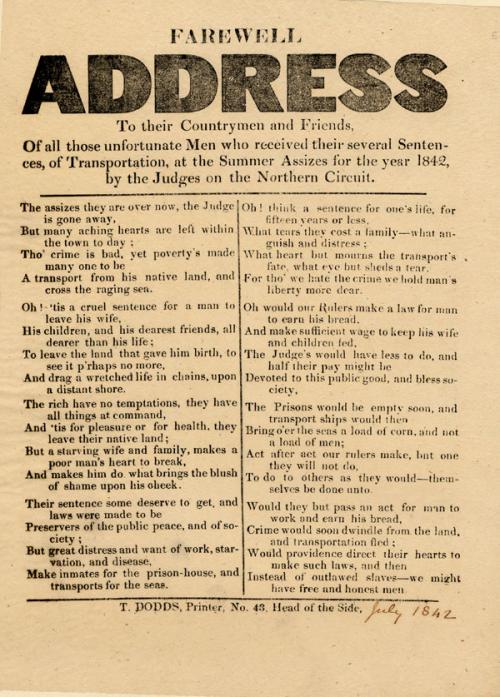
[1842]
Ballata di anonimo autore inglese raccolta da John Bell, ricercatore folklorico e bibliotecario in Newcastle
Nel primo volume di una raccolta di broadsides conservata presso gli archivi dell’Università di Newcastle upon Tyne, Inghilterra.
Testo trovato sul sito del FARNE, Folk Archive Resource North East
Lament on the transportation of criminals to the colonies.
At the time this song was printed, the British penal code was extremely harsh. In the late eighteenth century Parliament had dramatically increased the number of capital offences and it was said that there were more executions annually in England than in all the rest of Europe. In Newcastle until well on into the second quarter of the nineteenth century, prisoners were hanged at Morpeth, Durham and Newcastle, before a great crowd of spectators, it being usual practice at Newcastle to hand over the body afterwards to the... (Continues)
Ballata di anonimo autore inglese raccolta da John Bell, ricercatore folklorico e bibliotecario in Newcastle
Nel primo volume di una raccolta di broadsides conservata presso gli archivi dell’Università di Newcastle upon Tyne, Inghilterra.
Testo trovato sul sito del FARNE, Folk Archive Resource North East
Lament on the transportation of criminals to the colonies.
At the time this song was printed, the British penal code was extremely harsh. In the late eighteenth century Parliament had dramatically increased the number of capital offences and it was said that there were more executions annually in England than in all the rest of Europe. In Newcastle until well on into the second quarter of the nineteenth century, prisoners were hanged at Morpeth, Durham and Newcastle, before a great crowd of spectators, it being usual practice at Newcastle to hand over the body afterwards to the... (Continues)
To their countrymen and friends, of all those unfortunate men who received their several sentences of transportation, at the Summer Assizes for the year 1842, by the judges on the Northern Circuit.
(Continues)
(Continues)
Contributed by Bernart Bartleby 2016/2/17 - 10:34
Truth Is

[2011]
Parole e musica di Gary Shearston (1939-2013), cantautore australiano.
Nell’album intitolato “Renegade”
Testo trovato sul sito dell’autore
Gary Shearston è morto nel 2013, ma ha avuto ancora tempo di realizzare quattro album dopo questo “Renegade”, dove il rinnegato è lui stesso che fa un bilancio della sua vita, un’esistenza piuttosto movimentata. Essere cantautore negli anni 60 – in Australia, come negli USA, come in Italia – significava spesso dare voce a delle istanze politiche, e anche Gary Shearston lo fece, schierandosi apertamente contro la guerra in Vietnam e la partecipazione dell’Australia a quell’aggressione americana, partecipando alle campagne in difese dei diritti degli aborigeni, prendendo posizione in favore del disarmo nucleare… Per queste sue posizioni Gary Shearston – che oltre tutto non aveva a difenderlo la notorietà di un John Lennon – pagò un prezzo piuttosto... (Continues)
Parole e musica di Gary Shearston (1939-2013), cantautore australiano.
Nell’album intitolato “Renegade”
Testo trovato sul sito dell’autore
Gary Shearston è morto nel 2013, ma ha avuto ancora tempo di realizzare quattro album dopo questo “Renegade”, dove il rinnegato è lui stesso che fa un bilancio della sua vita, un’esistenza piuttosto movimentata. Essere cantautore negli anni 60 – in Australia, come negli USA, come in Italia – significava spesso dare voce a delle istanze politiche, e anche Gary Shearston lo fece, schierandosi apertamente contro la guerra in Vietnam e la partecipazione dell’Australia a quell’aggressione americana, partecipando alle campagne in difese dei diritti degli aborigeni, prendendo posizione in favore del disarmo nucleare… Per queste sue posizioni Gary Shearston – che oltre tutto non aveva a difenderlo la notorietà di un John Lennon – pagò un prezzo piuttosto... (Continues)
For a while, I forgot who I was,
(Continues)
(Continues)
Contributed by Bernart Bartleby 2016/2/17 - 09:33
Ruanda

E' morto l'ex segretario generale Onu, l'egiziano Boutros Ghali. Aveva 93 anni.
Lo chiamavano "Il Faraone", per via della sua alterigia e suscettibilità. Lui e la sua ONU furono tra i responsabili, diretti ed indiretti, delle tragedie di Bosnia e Ruanda.
Non che quelli che lo hanno preceduto (vedi Kofi Annan, la cui famiglia speculava sul già scandaloso embargo all'Iraq e sul programma americano "Oil For Food") e seguito (vedi l'attuale Ban Ki-moon, figura totalmente inutile) abbiano fatto molto meglio...
A parziale discolpa di tutti costoro, c'è da dire che non esiste un'organizzazione internazionale che possa anche solo minimamente determinare in meglio i destini dell'umanità, mai come ora soggetta soltanto ad un manipolo di ricchi potenti psicopatici assassini, tra i quali quelli dello Stato Islamico sono solo gli ultimi arrivati e nemmeno i più letali...
Lo chiamavano "Il Faraone", per via della sua alterigia e suscettibilità. Lui e la sua ONU furono tra i responsabili, diretti ed indiretti, delle tragedie di Bosnia e Ruanda.
Non che quelli che lo hanno preceduto (vedi Kofi Annan, la cui famiglia speculava sul già scandaloso embargo all'Iraq e sul programma americano "Oil For Food") e seguito (vedi l'attuale Ban Ki-moon, figura totalmente inutile) abbiano fatto molto meglio...
A parziale discolpa di tutti costoro, c'è da dire che non esiste un'organizzazione internazionale che possa anche solo minimamente determinare in meglio i destini dell'umanità, mai come ora soggetta soltanto ad un manipolo di ricchi potenti psicopatici assassini, tra i quali quelli dello Stato Islamico sono solo gli ultimi arrivati e nemmeno i più letali...
Bernart Bartleby 2016/2/17 - 08:31
Eusko gudariak

EUSKAL HERRIA: LIBERARE TUTTI!
(Gianni Sartori)
Toccando ferro, è probabile che il 1 marzo (un mese prima di quanto finora previsto) Arnaldo Otegi esca dalle galere spagnole dove è rinchiuso dall'ottobre 2009.
Era stato condannato ad una pena spropositata, anche dal punto di vista della legalità statuale, per “apologia di terrorismo”.
In sostanza:
1) aver partecipato ad una iniziativa a sostegno del prigioniero politico José Maria Sagardui;
2) aver definito il re di Spagna “capo dei torturatori”;
3) aver tentato, secondo l'accusa, di ricostituire l'organizzazione BATASUNA (v. l'operazione Bateragune).
DA BILBO....
A sostegno dei prigionieri baschi, il mese scorso (gennaio 2016) si sono tenute alcune grandi manifestazioni, in particolare a Bilbo (Paese basco sotto amministrazione spagnola) e Bayona (Paese basco sotto amministrazione francese, Iparralde): per il rispetto dei diritti... (Continues)
(Gianni Sartori)
Toccando ferro, è probabile che il 1 marzo (un mese prima di quanto finora previsto) Arnaldo Otegi esca dalle galere spagnole dove è rinchiuso dall'ottobre 2009.
Era stato condannato ad una pena spropositata, anche dal punto di vista della legalità statuale, per “apologia di terrorismo”.
In sostanza:
1) aver partecipato ad una iniziativa a sostegno del prigioniero politico José Maria Sagardui;
2) aver definito il re di Spagna “capo dei torturatori”;
3) aver tentato, secondo l'accusa, di ricostituire l'organizzazione BATASUNA (v. l'operazione Bateragune).
DA BILBO....
A sostegno dei prigionieri baschi, il mese scorso (gennaio 2016) si sono tenute alcune grandi manifestazioni, in particolare a Bilbo (Paese basco sotto amministrazione spagnola) e Bayona (Paese basco sotto amministrazione francese, Iparralde): per il rispetto dei diritti... (Continues)
Gianni Sartori 2016/2/17 - 08:09
×
![]()

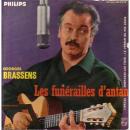


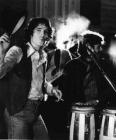




![Lili Marleen [Lied eines jungen Wachtpostens]](img/thumb/c1600_130x140.jpeg?1328915965)
